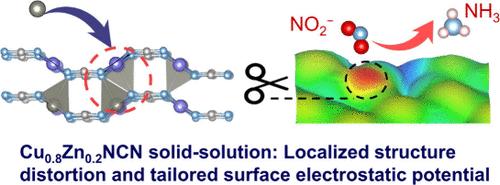A Copper–Zinc Cyanamide Solid-Solution Catalyst with Tailored Surface Electrostatic Potentials Promotes Asymmetric N-Intermediate Adsorption in Nitrite Electroreduction
IF 14.4
1区 化学
Q1 CHEMISTRY, MULTIDISCIPLINARY
引用次数: 0
Abstract
The electrocatalytic nitrite reduction (NO2RR) converts nitrogen-containing pollutants to high-value ammonia (NH3) under ambient conditions. However, its multiple intermediates and multielectron coupled proton transfer process lead to low activity and NH3 selectivity for the existing electrocatalysts. Herein, we synthesize a solid-solution copper–zinc cyanamide (Cu0.8Zn0.2NCN) with localized structure distortion and tailored surface electrostatic potential, allowing for the asymmetric binding of NO2–. It exhibits outstanding NO2RR performance with a Faradaic efficiency of ∼100% and an NH3 yield of 22 mg h–1 cm–2, among the best for such a process. Theoretical calculations and in situ spectroscopic measurements demonstrate that Cu–Zn sites coordinated with linear polarized [NCN]2– could transform symmetric [Cu–O–N–O–Cu] in CuNCN-NO2– to a [Cu–N–O–Zn] asymmetric configuration in Cu0.8Zn0.2NCN-NO2–, thus enhancing adsorption and bond cleavage. A paired electro-refinery with the Cu0.8Zn0.2NCN cathode reaches 2000 mA cm–2 at 2.36 V and remains fully operational at industrial-level 400 mA cm–2 for >140 h with a NH3 production rate of ∼30 mgNH3 h–1 cm–2. Our work opens a new avenue of tailoring surface electrostatic potentials using a solid-solution strategy for advanced electrocatalysis.

求助全文
约1分钟内获得全文
求助全文
来源期刊
CiteScore
24.40
自引率
6.00%
发文量
2398
审稿时长
1.6 months
期刊介绍:
The flagship journal of the American Chemical Society, known as the Journal of the American Chemical Society (JACS), has been a prestigious publication since its establishment in 1879. It holds a preeminent position in the field of chemistry and related interdisciplinary sciences. JACS is committed to disseminating cutting-edge research papers, covering a wide range of topics, and encompasses approximately 19,000 pages of Articles, Communications, and Perspectives annually. With a weekly publication frequency, JACS plays a vital role in advancing the field of chemistry by providing essential research.

 求助内容:
求助内容: 应助结果提醒方式:
应助结果提醒方式:


